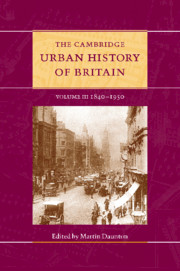Book contents
- Frontmatter
- 1 Introduction
- Part I Circulation
- Part II Governance
- Part III Construction
- Part IV Getting and spending
- 18 Industrialisation and the city economy
- 19 The urban labour market
- 20 Urban fertility and mortality patterns
- 21 The middle class
- 22 Towns and consumerism
- 23 Playing and praying
- Part V Images
- Select bibliography
- Index
- Plates 1-7
- Plates 8-14
- Plates 15-20
- Plates 21-27
- Plates 28-34
- Plates 35-41
- Plates 42-48>
- Plates 49-53
- References
22 - Towns and consumerism
from Part IV - Getting and spending
Published online by Cambridge University Press: 28 March 2008
- Frontmatter
- 1 Introduction
- Part I Circulation
- Part II Governance
- Part III Construction
- Part IV Getting and spending
- 18 Industrialisation and the city economy
- 19 The urban labour market
- 20 Urban fertility and mortality patterns
- 21 The middle class
- 22 Towns and consumerism
- 23 Playing and praying
- Part V Images
- Select bibliography
- Index
- Plates 1-7
- Plates 8-14
- Plates 15-20
- Plates 21-27
- Plates 28-34
- Plates 35-41
- Plates 42-48>
- Plates 49-53
- References
Summary
Percy Redfern, the historian of the Co-operative Wholesale Society, published a series of lectures in 1920 on The Consumers’ Place in Society. This was a tract in praise of consumer democracy and the co-operative commonwealth, stressing that trade union struggles were necessarily sectionalist and the only way to advance and protect the interests of the masses was through the mobilisation of consumers. Redfern began, however, with a lament:
Libraries of books, publications of a special Ministry of Uses, and many journals would be necessary to deal adequately and continuously with the consumers’ problem of organising the world and its resources for the utmost human use and enjoyment. These do not exist. Manchester, for some uncomplimentary reason, is supposed to be the special home of consumers’ advocacy. Yet the Manchester Reference Library – an admirable institution – contains sufficient volumes under the title ‘Labour’ to fill several crowded pages of its great catalogue; whereas a single entry under consumption (amidst two-score devoted to the disease) provides for all the books specifically relating to the consumer.
Until a few years ago that could almost have been said of books on the social history of consumption and consumerism in Britain, as compared with the proliferating historiography of popular politics and the labour movement. Now the wheel is turning with gathering momentum, as the older heavy industries decline into extinction and consumer-related topics are fashionable, while studies of the labour movement are in eclipse. This may be thought a rather present-minded set of preoccupations, but history has always been written thus, and earlier neglect of consumption was undoubtedly misplaced.
- Type
- Chapter
- Information
- The Cambridge Urban History of Britain , pp. 715 - 744Publisher: Cambridge University PressPrint publication year: 2001
References
- 1
- Cited by



